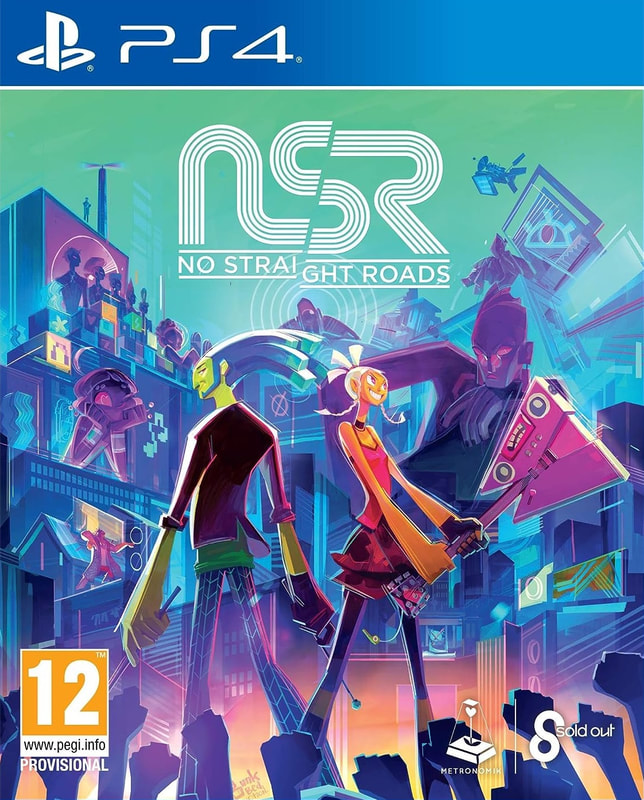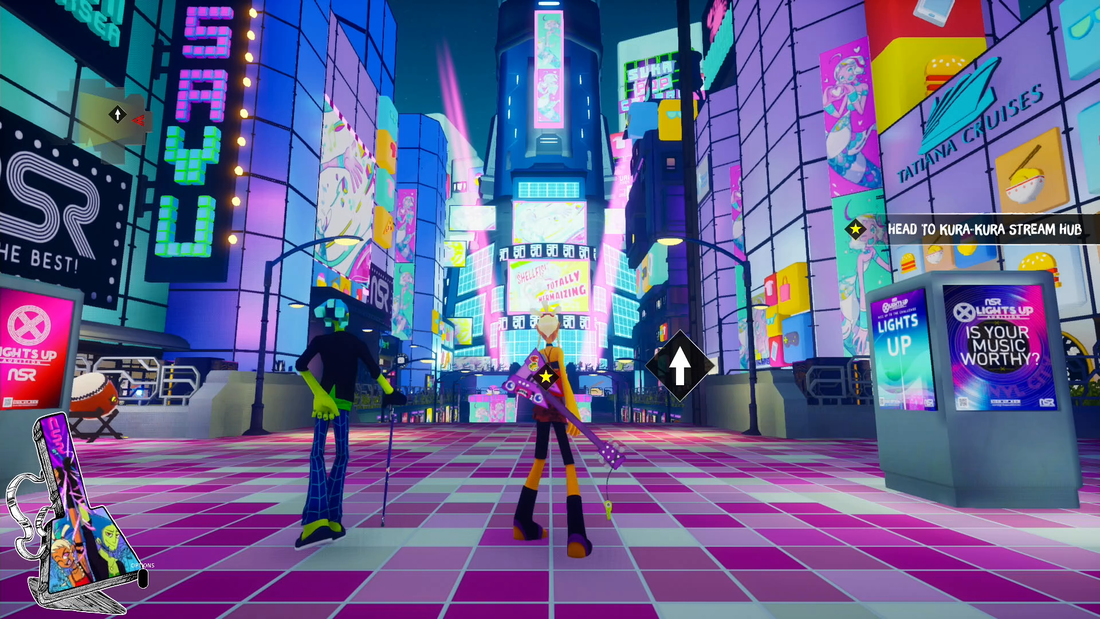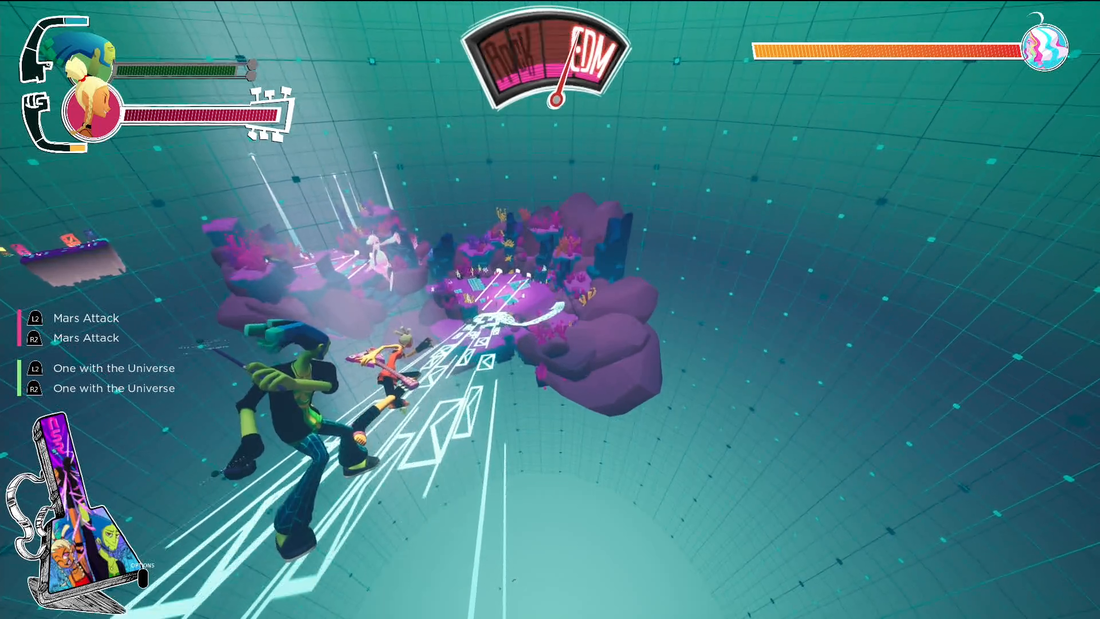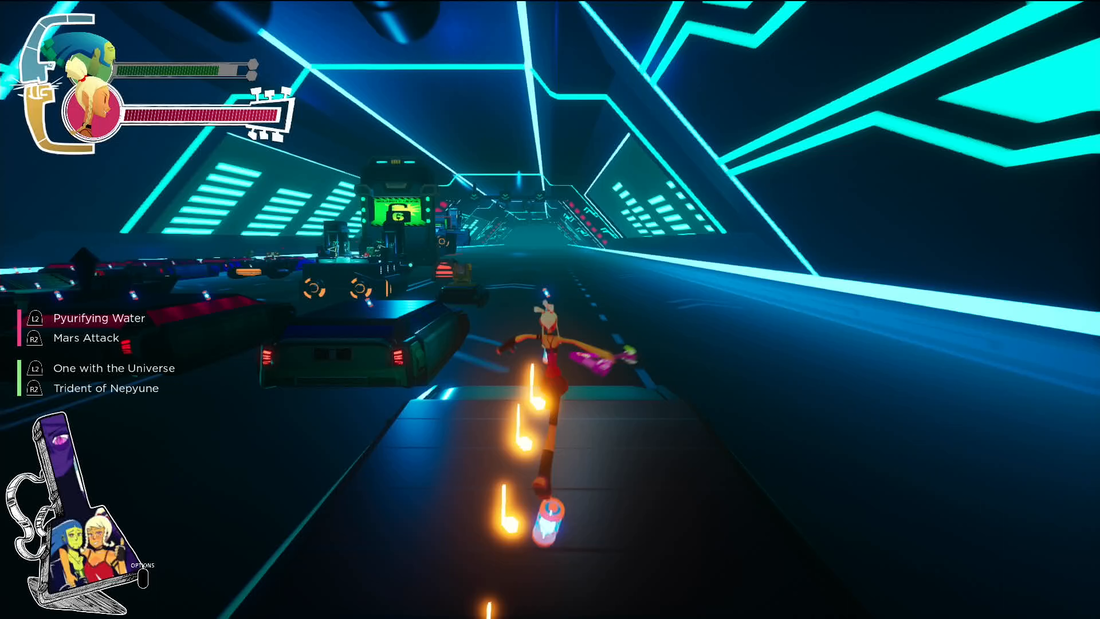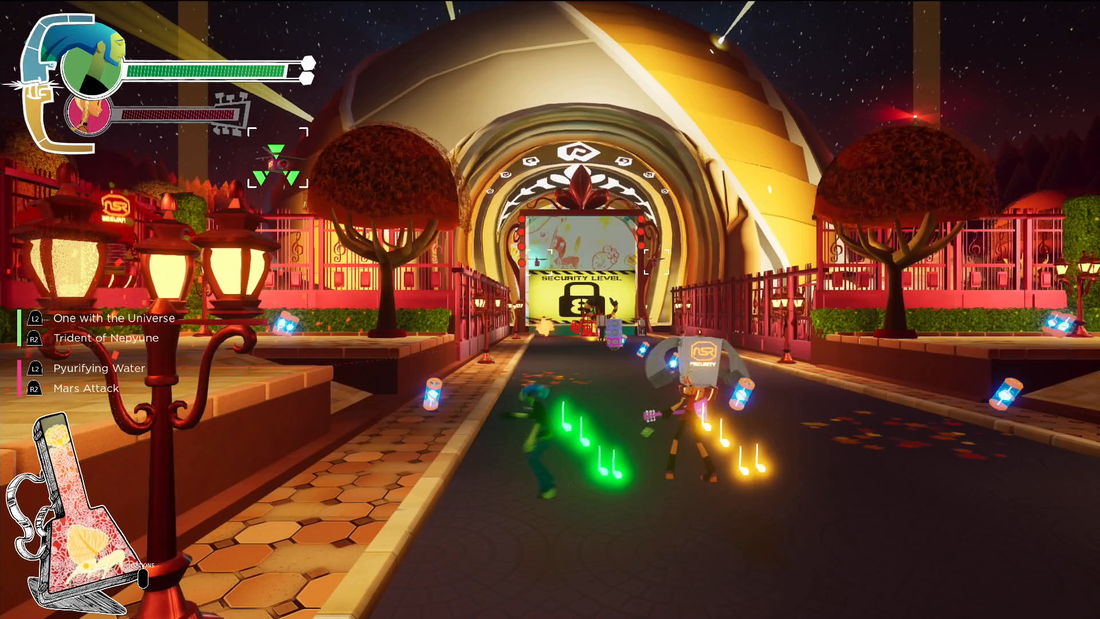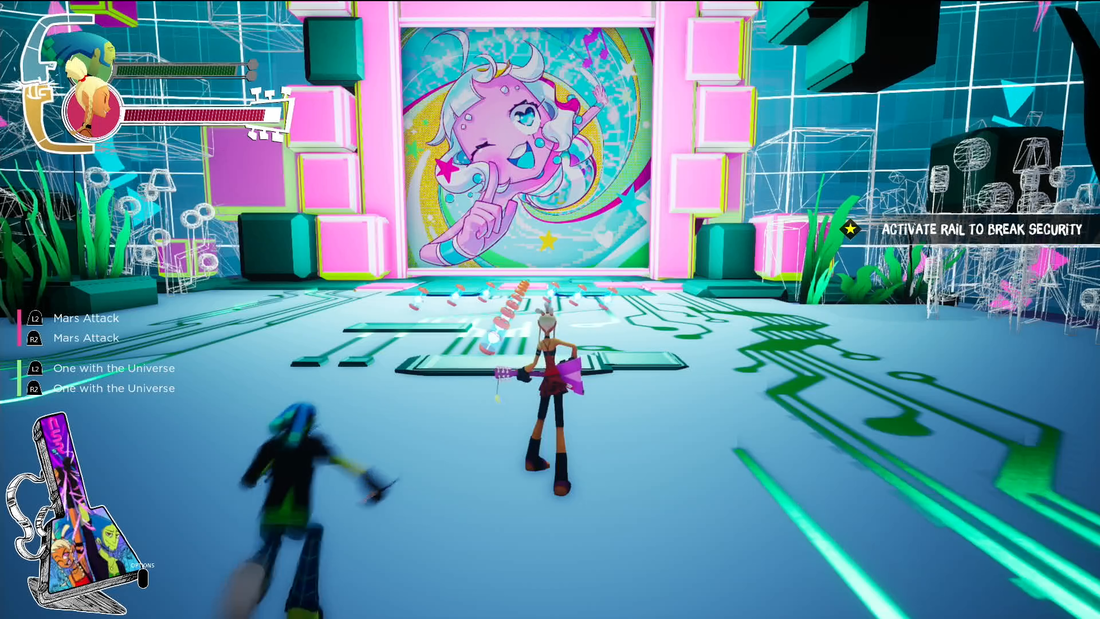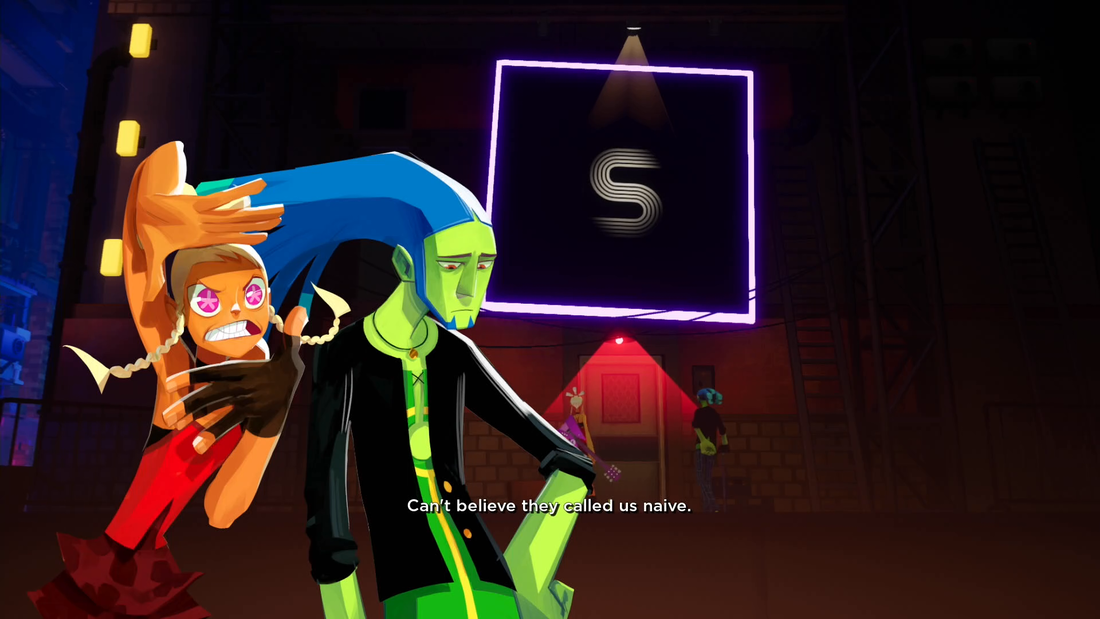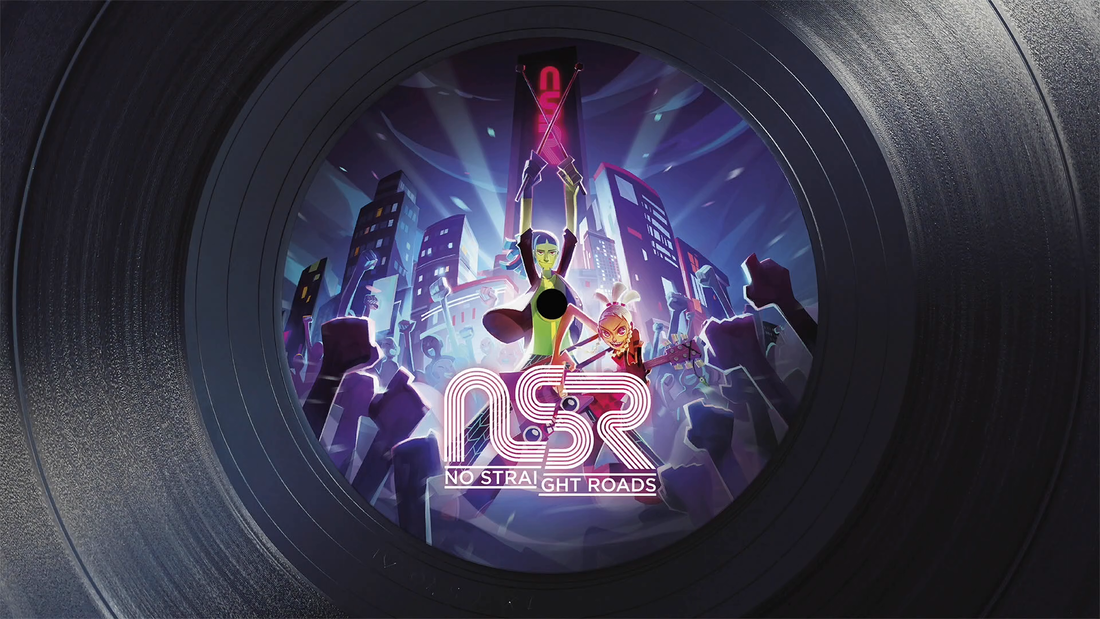NO STRAIGHT ROADS (PS4)
As the 2010s unfolded, gaming had entered an era when big publishers had become determined to play things safe. Guaranteed successes drew the larger money pots, and so with a sense of inevitably, the likes of FIFA, Assassin’s Creed and Call of Duty could be depended on to provide strong game engines, but next to nothing in the sense of new gaming experiences. The knock-on effect of this, together with an ever-increasing number of remasters and remakes, is that there are few surprises to be found amongst big games. Surprises are good: games have always been more enthralling when the player isn’t sure what’s around the next corner. With this analogy in mind, No Straight Roads is aptly named: a sparklingly creative effort from Malaysian developers Metronomik, and one that plays fantastically well.
A rhythm-orientated beat ‘em up, No Straight Roads plays host to a classic underdog story. Mayday, a fiery guitarist, and Zuke, a chilled-out drummer, form the rock band Bunkbed Junction, and the tutorial takes the form of a breathless audition on the biggest talent-spotting TV show: No Straight Roads. When they are slapped down by the head of NSR, Tatiana, they decide to fight back. In a neat twist, Vinyl City is powered by music and as BBJ discover, frequent blackouts see the elites prioritised over ordinary folk. Tatiana may believe electronic dance music is what the people want, but it’s up to Mayday and Zuke to defeat each musical lynchpin from the various districts of the city, to put rock back on the map and the band on top of the music world.
Vinyl City needs powering up and there are all kinds of attractions to unearth
No Straight Roads is compact but perfectly formed. The city can be explored via small snippets of open-world, where the player can restore power, accrue fans and uncover buffs, collectables and secrets. These areas look tremendous; there’s definitely a hint of Persona to the graffiti-art stylings and the funky music. Swapping between Mayday and Zuke prompts entirely different responses to all of the city’s interactive spots, which is a really cool touch and a clever way of highlighting the different ways in which the two protagonists see things. It’s the bosses that form the meat of the game, as each can be tackled after a short “approach” sequence. The boss fights are excellent across the board and here NSR draws parallels with platformer classic Psychonauts. Every encounter is a fresh experience, with entirely different tones brought about by a diverse range of music and gameplay elements.
You can swap between the two lead protagonists at any time, allowing for different move sets, specials and perks. Strategically, it’s also smart to rotate members, as the inactive member sees lost health replenished. There’s also the option to play couch co-op, with the benefit of health regeneration removed, but both players able to attack concurrently. Beating the bosses isn’t too hard, but with additional difficulties Hard, Crazy, Parry and the one-hit-and-you’re-done nightmare that is Perfect Parry to master, you’ll soon be acquainted with their nuances.
You can swap between the two lead protagonists at any time, allowing for different move sets, specials and perks. Strategically, it’s also smart to rotate members, as the inactive member sees lost health replenished. There’s also the option to play couch co-op, with the benefit of health regeneration removed, but both players able to attack concurrently. Beating the bosses isn’t too hard, but with additional difficulties Hard, Crazy, Parry and the one-hit-and-you’re-done nightmare that is Perfect Parry to master, you’ll soon be acquainted with their nuances.
Things kick off in suitably ambitious style with a battle against DJ Subatomic Supernova, who spins planets around his turntable whilst launching meteorites and space debris the way of the player. He is swiftly followed by Sayu, an internet sensation who must be tackled in a virtual space. This makes for a discombobulating experience as the game sees hackers breaking the fourth wall, messing with the brightness levels, tampering with traps and attacking the player directly. A side-level featuring Zuke’s brother DK West is superb, as a trio of rap battles reveal a less placid side to the normally unflappable drummer. Provided you can get a friend to help you through the tricky dual-screen hazard dodgems, you’ll get to see their feud tempered marvellously by Mayday’s unexpected freestyle rap during their final encounter.
No Straight Roads succeeds in large part thanks to its satisfying combat, as combos and beat-related parries provide depth as well as enjoyment. The player can unlock a myriad of new abilities with extended play, and returning to earlier battles to improve your ranking proves compelling. Sharp controls and precise, clean level design means it runs fantastically. The epic, feel-good level conclusions hit all the right notes, and it’s always a rush to see the pair using their red-light/green-light finisher move, together with the marvellous vinyl art that commemorates their victories. Vinyl City is replete with funny, eccentric and likeable characters. Mayday in particular steals the show: she goes completely bananas at times and you can’t help but love the zeal with which she takes the fight to NSR. The humorous aspects feel natural enough to give life to the setting, without seeming overworked.
No Straight Roads succeeds in large part thanks to its satisfying combat, as combos and beat-related parries provide depth as well as enjoyment. The player can unlock a myriad of new abilities with extended play, and returning to earlier battles to improve your ranking proves compelling. Sharp controls and precise, clean level design means it runs fantastically. The epic, feel-good level conclusions hit all the right notes, and it’s always a rush to see the pair using their red-light/green-light finisher move, together with the marvellous vinyl art that commemorates their victories. Vinyl City is replete with funny, eccentric and likeable characters. Mayday in particular steals the show: she goes completely bananas at times and you can’t help but love the zeal with which she takes the fight to NSR. The humorous aspects feel natural enough to give life to the setting, without seeming overworked.
Whilst the game embraces all the musical genres it represents, it’s also sharp enough to comment on their perceived shortcomings, through each of the kingpins. 1010 (Ten-Ten), an android boy band complete with hilarious, auto-tuned battle commands, are a brilliant example. They’re portrayed as having members so disposable, they’re literally replaced as you fight, via a flying factory. Yinu, meanwhile, is a prodigal child pianist, but her level quickly morphs into a blazing battle with her demonic, overbearing mother. Eve views music and art as inseparable, resulting in an incredibly abstract encounter, where the player will have their hands full switching between characters and picking their way through weird mise-en-scene.
Fire and ice? Mayday and Zuke make for a dynamic pairing
Yes, six boss encounters (plus the approach sequences and DK West’s asides) don’t amount to a huge amount of longevity, on paper. However, the game plays so well that when coupled with a decent trophy list, it provided all the incentive I needed to play through the levels five or six times over. For pound-for-pound quality, it’s hard to fault it. There isn’t a level that isn’t awash with creativity, and they are, without exception, compelling and enjoyable. If you’re open to something different, No Straight Roads is a wonderful game that’s richly deserving of your time.
OTHER GAMES WITH DISTINCTIVE AUDIO-VISUAL DESIGN REVIEWED
